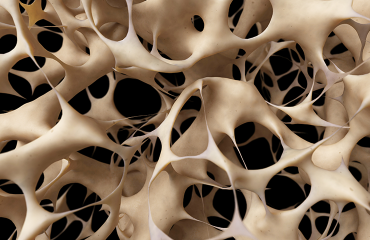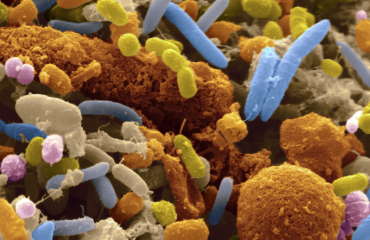An Excerpt from: Sex Gender and Epigenetics: From Bedside to Molecule
Ask a layperson what biologically differentiates males and females, and at least two different answers will undoubtedly emerge: gonads and hormones. Indeed, the fact that males have testes and females have ovaries leads to a lifelong sexually dimorphic hormonal profile, especially in testosterone, estradiol, and progesterone levels. These sex hormones exert both permanent and protein modification.
In particular, sex hormones appear to have sex-dependent effects on the cardiometabolic profile. Body composition is a prime example. Strong evidence indicates that estrogen protects women from the accumulation of visceral abdominal tissue. (VAT). 1-3 This is clinically significant because VAT is strongly associated with poor cardiometabolic health and CVD.4 A clear sex difference in body shape is observed in early adulthood when BMI is associated with hips and bust measurements in women but with chest and waist measurements in men.5 While men naturally have low levels of estrogen, testosterone levels is associated with an increase in VAT6-7.
These observations can be generalized. Normal physiological concentrations of sex, hormones improve the cardiometabolic health of both sexes.8-9 The converse also holds: elevated levels of testosterone in women and estrogen in men lead to poor cardiometabolic health outcomes, as demonstrated by women with polycystic ovary syndrome, 10transmen and on gender affirmative hormonal therapy,11 and hypogonadal men12.Therefore, circulating sex hormones alone cannot explain the observed sex differences in cardiovascular traits. While it is likely that the men and women also have different blueprints, which shifts our attention to the subcellular level and DNA
21-3 Kangas R, Morsiani C, Pizza G, et al, Menopause and adipose tissue:miR-19-p3 is sensitive to hormonal replacement. Oncotarget. 2018;9(2):2279-2294
Marchand GB, Carreau A-M Weisnagel SJ, et al. Increased body fat mass explains the positive association between circulating estradiol and insulin in postmenopausal women. Am J Physiol Endocrinol Metab 2018;314(5):E448-E456
Leenen R, van der Kooy K, Seidell JC, Deurenberg P, Koppeschaar HP. Visceral fat accumulation in relation to sex hormones in obese men and women undergoing weight loss therapy. J Clin Endocrinol Metab. 1994;78(6):1515-1520
4 Piché M-E, Tchernof A, Després J-P. Obesity phenotypes, diabetes, and cardiovascular diseases. Circ Res. 2020;126(11);1477-1500
5 Wells JCK, TreleavenP, Cole TJ. BMI compared with 3-dimensional body shape: the UK National Sizing Survey. Am J Clin Nutr. 2007;85(2):419-425
6-7 Laaksonen DE, Niskanen L, Punnonen K, et al. The metabolic syndrome and smoking in relation to hypogonadism in middle-aged men: a prospective cohort study. J Clin Endocrinol Metab. 2005;90(2):712-719.
Rolf C, von Eckardstein S, Koken U, Nieschlag E. Testosterone substitution of hypogonadal men prevents the age-dependent increases in body mass index, body fat and leptin seen in healthy aging men: results of a cross-sectional study. EurJ Endocrinal. 2002;146(4):505-511.
8-9 dos Santos RL., da Silva FB, Ribierto Jr RF, Stefanon I. Sex hormones in the cardiovascular system. Horm Mol Biol Clin Invest. 2014;18(2):89-103.
Boese AC, Kim SC, Yin K-J, Lee J-P, Hamblin MH. Sex differences in vascular physiology and pathophysiology: estrogen and androgen signaling in health and disease. Am J Physiol Heart Circ Physiol. 2017;313(3):H524-H545.
10 Bajuk Studen K, Pfeifer M, Cardiometabolic risk in polycystic ovary syndrome. Endocr Connect.2018;7(7):R238-R251.
11 Vroccheti C, Castellini G, Iacuaniello D, et al. Does gender-affirming hormonal treatment affect 30-year cardiovascular risk in transgender persons? A two year prospective European study (ENIGI). J sex Med. 2021;18(4):821-829
12 Krzastek SC, Smith RP. Non-testosterone management of male hypogonadism an examination of the existing literature. Transl Androl Urol.2020,9(Suppl.2):S160-S170
Marianne J. Legato, MD, Ph. D. (hon. c.), FACP is an internationally renowned academic, physician, author, lecturer, and pioneer in the field of gender-specific medicine. She is a Professor Emerita of Clinical Medicine at Columbia University College of Physicians & Surgeons and an Adjunct Professor of Medicine at Johns Hopkins Medical School. Dr. Legato is also the Director of the Foundation for Gender-Specific Medicine, which she founded in 2006 as a continuation of her work with The Partnership for Gender-Specific Medicine at Columbia University. She received an honorary PhD from the University of Panama in 2015 for her work on the differences between men and women.
At its core, gender-specific medicine is the science of how normal human biology differs between men and women and how the diagnosis and treatment of disease differs as a function of gender. Dr. Legato’s discoveries and those of her colleagues have led to a personalization of medicine that assists doctors worldwide in understanding the difference in normal function of men and women and in their sex-specific experiences of the same diseases.
She began her work in gender-specific medicine by authoring the first book on women and heart disease, The Female Heart: The Truth About Women and Coronary Artery Disease, which won the Blakeslee Award of the American Heart Association in 1992. Because of this research, the cardiovascular community began to include women in clinical trials affirming the fact that the risk factors, symptoms, and treatment of the same disease can be significantly different between the sexes. Convinced that the sex-specific differences in coronary artery disease were not unique, Dr. Legato began a wide-ranging survey of all medical specialties and in 2004, published the first textbook on gender-specific medicine, The Principles of Gender-Specific Medicine. The second edition appeared in 2010 and the third edition, dedicated to explaining how gender impacts biomedical investigation in the genomic era, won the PROSE Award in Clinical Medicine from the Association of American Publishers in 2018. A fourth edition is forthcoming.
She also founded the first scientific journals publishing new studies in the field, The Journal of Gender-Specific Medicine, and a newer version, Gender Medicine, both listed in the Index Medicus of the National Library of Medicine. She has founded a third peer-reviewed, open access journal, Gender and the Genome, which focuses on the impact of biological sex on technology and its effects on human life.
Dr. Legato is the author of multiple works, including: What Women Need to Know (Simon & Schuster, 1997), Eve’s Rib (Harmony Books, 2002), Why Men Never Remember and Women Never Forget (Rodale, 2005), Why Men Die First (Palgrave, 2008), The International Society for Gender Medicine: History and Highlights (Academic Press, 2017), and most recently, The Plasticity of Sex (Academic Press, 2020). Her books have been translated into 28 languages to date.
As an internationally respected authority on gender medicine, Dr. Legato has chaired symposia and made keynote addresses to world congresses in gender-specific medicine in Berlin, Israel, Italy, Japan, Panama, South Korea, Stockholm, and Vienna. In collaboration with the Menarini Foundation, she is co-chairing a symposium on epigenetics, Sex, Gender and Epigenetics: From Molecule to Bedside, to be held in Spring 2021 in Italy. She maintains one of the only gender-specific private practice in New York City, and she has earned recognition as one of the “Top Doctors in New York.”





